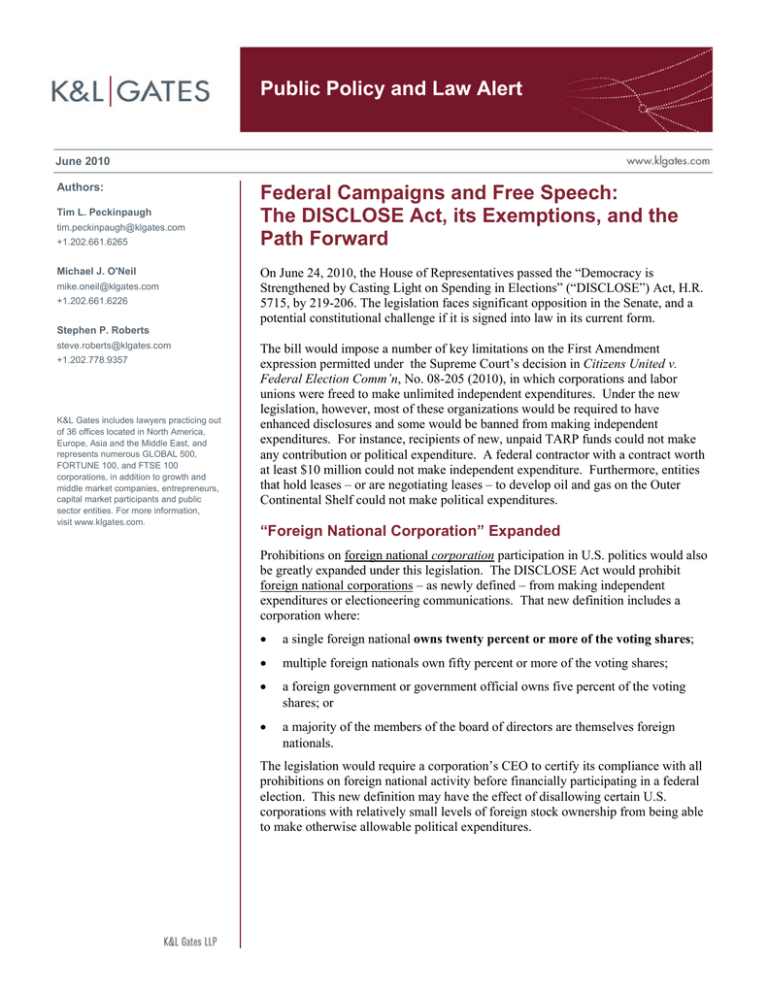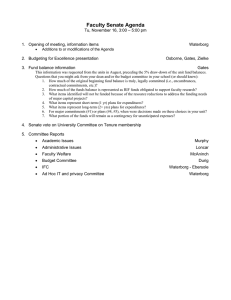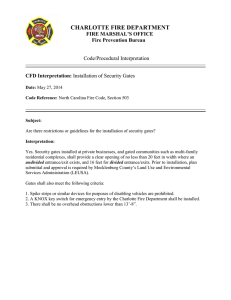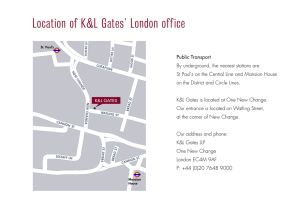
Public Policy and Law Alert
June 2010
Authors:
Tim L. Peckinpaugh
tim.peckinpaugh@klgates.com
+1.202.661.6265
Michael J. O'Neil
mike.oneil@klgates.com
+1.202.661.6226
Federal Campaigns and Free Speech:
The DISCLOSE Act, its Exemptions, and the
Path Forward
On June 24, 2010, the House of Representatives passed the “Democracy is
Strengthened by Casting Light on Spending in Elections” (“DISCLOSE”) Act, H.R.
5715, by 219-206. The legislation faces significant opposition in the Senate, and a
potential constitutional challenge if it is signed into law in its current form.
Stephen P. Roberts
steve.roberts@klgates.com
+1.202.778.9357
K&L Gates includes lawyers practicing out
of 36 offices located in North America,
Europe, Asia and the Middle East, and
represents numerous GLOBAL 500,
FORTUNE 100, and FTSE 100
corporations, in addition to growth and
middle market companies, entrepreneurs,
capital market participants and public
sector entities. For more information,
visit www.klgates.com.
The bill would impose a number of key limitations on the First Amendment
expression permitted under the Supreme Court’s decision in Citizens United v.
Federal Election Comm’n, No. 08-205 (2010), in which corporations and labor
unions were freed to make unlimited independent expenditures. Under the new
legislation, however, most of these organizations would be required to have
enhanced disclosures and some would be banned from making independent
expenditures. For instance, recipients of new, unpaid TARP funds could not make
any contribution or political expenditure. A federal contractor with a contract worth
at least $10 million could not make independent expenditure. Furthermore, entities
that hold leases – or are negotiating leases – to develop oil and gas on the Outer
Continental Shelf could not make political expenditures.
“Foreign National Corporation” Expanded
Prohibitions on foreign national corporation participation in U.S. politics would also
be greatly expanded under this legislation. The DISCLOSE Act would prohibit
foreign national corporations – as newly defined – from making independent
expenditures or electioneering communications. That new definition includes a
corporation where:
•
a single foreign national owns twenty percent or more of the voting shares;
•
multiple foreign nationals own fifty percent or more of the voting shares;
•
a foreign government or government official owns five percent of the voting
shares; or
•
a majority of the members of the board of directors are themselves foreign
nationals.
The legislation would require a corporation’s CEO to certify its compliance with all
prohibitions on foreign national activity before financially participating in a federal
election. This new definition may have the effect of disallowing certain U.S.
corporations with relatively small levels of foreign stock ownership from being able
to make otherwise allowable political expenditures.
Public Policy and Law Alert
Certain Entities Wholly Exempt
The legislation would exempt certain 501(c)(4)
organizations that meet narrow criteria. These
entities must have (1) been tax exempt for 10 years;
(2) at least 500,000 annual dues-paying members;
(3) at least one member from each state (including
the District of Columbia and Puerto Rico); (4) not
received donations from corporations totaling more
than 15 percent of their total donations; and (5) not
used any corporate or labor union donations for
campaign-related activity. As a practical matter,
only a handful of organizations would presently be
exempt under these factors, e.g., the National Rifle
Association and the Sierra Club.
Enhanced Disclaimers Required:
“Stand By Your Ad” Expanded
Disclaimers would be required for all independent
expenditures and electioneering communications,
including “public communications.” These include
television and radio ads, along with direct mail,
robocalls, and other types of political ads. Notably,
robocall disclaimers would be required at the
beginning of the call. Electioneering
communications or independent expenditures with a
public communications component must generally
have a “Top Five Funders” disclosure at the end that
would list the top five donors for that
communication.
Additionally, an electioneering communication or
independent expenditure with a public
communication paid for by a covered organization
(such as a corporation, labor union, or trade
association) would be required to have a “significant
funder” disclosure statement. Practically speaking,
this means that such ads would have to include a
disclaimer at the end featuring the “significant
funder” on screen, saying “I am Joe Smith. I helped
to pay for this message, and I approve it.”
Ordinarily, this would apply to the individual who
provided the most to the expenditure or organization
making an expenditure (with a donation of at least
$100,000), but under certain circumstances it could
also mean someone who provided as little as
$10,000 to the organization for general campaign
activity. Ads would also be required to identify the
city and state where the individual or organization
sponsoring the ad is located.
“Stand by your ad” provisions would also be
extended to other non-candidate entities placing ads.
This means that broadcast political ads could soon
have disclaimers that would be required to state
information in the following form: “I am Joe Smith,
the Chairman of Americans for Stronger Families.
Americans for Stronger Families helped to pay for
this message, and Americans for Stronger Families
approves it.”
Enhanced Disclosures: FEC Reports,
Shareholder Reports and Lobbyist LD203 Reports
The DISCLOSE Act would impose a number of
new reporting requirements, as detailed below, on
any non-exempt organization required to file a
covered FEC report.
Entities filing an independent expenditure report
with the FEC would be forced to disclose any
donor giving $600 or more in a 12-month reporting
period if, broadly, those donations were used or
intended for political purposes. In most cases, one
organization’s transfer of funds to another
organization for an independent expenditure would
be considered the same as making a direct
independent expenditure. Similar reports for
electioneering communications must be filed
disclosing those donors giving $1,000 or more in a
reporting period if, broadly, those donations were
used or intended for political purposes. However,
the bill exempts organizations from disclosure
where donations are collected from individual
members’ dues on a regular, periodic basis, i.e.,
labor unions and other similarly structured dues
organizations.
Under the legislation, a covered organization
engaging in federal campaign activity must have its
CEO or highest ranking official file a statement with
the FEC stating that none of the corporation’s
campaign activity was coordinated with a candidate
committee, and that the CEO has reviewed all FEC
reports filed and each is correct. The report would
be filed under penalty of perjury.
If the DISCLOSE Act becomes law, a corporation
would be required to include in its regular financial
reports to shareholders detailed information
regarding disbursements it made for campaignJune 2010
2
Public Policy and Law Alert
related expenditures. The required disclosures must
be made in a “clear and conspicuous manner.”
Similar requirements may also apply to other
membership organizations or labor unions in reports
to their members or donors. Corporate websites
would also require modification to address these
added disclosure requirements.
Registered federal lobbyists would also be required
to make further disclaimers under this new
legislation. Lobbyists would be required to add to
their semi-annual LD-203 reports any independent
expenditures or electioneering communications they
made themselves.
Senate Prospects
The DISCLOSE Act is likely to face an uphill climb
in the Senate. There is likely sufficient opposition to
the bill to require Senate leadership to cobble
together a coalition of 60 votes to avoid a filibuster.
However, with strong opposition from both the right
and the left (due in part to the NRA/Sierra Club
exemption, discussed above), along with the passing
of Sen. Robert Byrd (D-WV), securing 60 votes may
be difficult. The crowded legislative calendar
dominated by oil spill and energy legislation, jobs
bills, the annual spending bills and a Supreme Court
nomination will further complicate efforts to pass
the DISCLOSE Act.
Constitutional Challenge Likely
Even if the DISCLOSE Act were to become law, it
likely would face constitutional challenges based on
its selective application of new prohibitions,
disclosures and disclaimers to only some entities.
The so-called “NRA/Sierra Club” exemption is the
most widely criticized example. The outright
prohibition on campaign expenditures by certain
federal contractors, TARP recipients, and offshore
leaseholders may also be targeted. Such a challenge
may make the case that the bill’s distinctions – such
as the number of years in existence, number of
members, or size of the federal contract a company
holds – are arbitrary limitations on speech and thus
impermissible under basic First Amendment law.
Furthermore, unlike the McCain-Feingold
Bipartisan Campaign Reform Act of 2002, there is
no provision in this legislation for expedited judicial
review. If enacted, a challenge to this legislation
must be made first to the D.C. District Court, then
proceed through the regular appellate process.
Anchorage Austin Beijing Berlin Boston Charlotte Chicago Dallas Dubai Fort Worth Frankfurt Harrisburg Hong Kong London
Los Angeles Miami Moscow Newark New York Orange County Palo Alto Paris Pittsburgh Portland Raleigh Research Triangle Park
San Diego San Francisco Seattle Shanghai Singapore Spokane/Coeur d’Alene Taipei Tokyo Warsaw
Washington, D.C.
K&L Gates includes lawyers practicing out of 36 offices located in North America, Europe, Asia and the Middle East, and represents numerous
GLOBAL 500, FORTUNE 100, and FTSE 100 corporations, in addition to growth and middle market companies, entrepreneurs, capital market
participants and public sector entities. For more information, visit www.klgates.com.
K&L Gates is comprised of multiple affiliated entities: a limited liability partnership with the full name K&L Gates LLP qualified in Delaware and
maintaining offices throughout the United States, in Berlin and Frankfurt, Germany, in Beijing (K&L Gates LLP Beijing Representative Office), in
Dubai, U.A.E., in Shanghai (K&L Gates LLP Shanghai Representative Office), in Tokyo, and in Singapore; a limited liability partnership (also named
K&L Gates LLP) incorporated in England and maintaining offices in London and Paris; a Taiwan general partnership (K&L Gates) maintaining an
office in Taipei; a Hong Kong general partnership (K&L Gates, Solicitors) maintaining an office in Hong Kong; a Polish limited partnership (K&L
Gates Jamka sp. k.) maintaining an office in Warsaw; and a Delaware limited liability company (K&L Gates Holdings, LLC) maintaining an office in
Moscow. K&L Gates maintains appropriate registrations in the jurisdictions in which its offices are located. A list of the partners or members in each
entity is available for inspection at any K&L Gates office.
This publication is for informational purposes and does not contain or convey legal advice. The information herein should not be used or relied upon
in regard to any particular facts or circumstances without first consulting a lawyer.
©2010 K&L Gates LLP. All Rights Reserved.
June 2010
3





